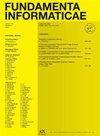Multigranulation Decision-theoretic Rough Set in Ordered Information System
IF 0.4
4区 计算机科学
Q4 COMPUTER SCIENCE, SOFTWARE ENGINEERING
引用次数: 49
Abstract
As a generalized extension of Pawlak’s rough set model, the multigranulation decision-theoretic rough set model in ordered information systems utilizes the basic set assignment function to construct probability measure spaces through dominance relations. It is an effective tool to deal with uncertain problems and widely used in practical decision problems. However, when the scale of dataset is large, it takes a lot of time to characterize the approximations of the target concept, as well as complicated calculation processes. In this paper, we develop a novel model called local multigranulation decision-theoretic rough set in an ordered information system to overcome the above-mentioned limitation. Firstly, to reduce the computing time of the information granule independent of the target concept, we only use the characterization of the elements in the target concept to approximate this target concept. Moreover, the corresponding local multigranulation decision-theoretic rough set in an ordered information system is addressed according to the established local model, and the comparisons are made between the proposed local algorithm and the algorithm of original multigranulation decision-theoretic rough set in ordered information systems. Finally, the validity of the local approximation operators is verified through the experimental evaluation using six datasets coming from the University of California-Irvine (UCI) repository.有序信息系统中的多粒决策理论粗糙集
有序信息系统中的多粒决策理论粗糙集模型作为Pawlak粗糙集模型的推广,利用基本集分配函数通过优势关系构造概率测度空间。它是处理不确定性问题的有效工具,在实际决策问题中得到了广泛的应用。然而,当数据集规模较大时,对目标概念的近似值进行表征需要花费大量时间,且计算过程复杂。本文在有序信息系统中建立了局部多粒决策理论粗糙集模型,克服了上述局限性。首先,为了减少独立于目标概念的信息颗粒的计算时间,我们只使用目标概念中元素的表征来近似该目标概念。根据所建立的局部模型,对有序信息系统中相应的局部多粒决策理论粗糙集进行求解,并将所提出的局部算法与有序信息系统中原有的多粒决策理论粗糙集算法进行比较。最后,利用来自加州大学欧文分校(UCI)知识库的6个数据集进行实验评估,验证了局部近似算子的有效性。
本文章由计算机程序翻译,如有差异,请以英文原文为准。
求助全文
约1分钟内获得全文
求助全文
来源期刊

Fundamenta Informaticae
工程技术-计算机:软件工程
CiteScore
2.00
自引率
0.00%
发文量
61
审稿时长
9.8 months
期刊介绍:
Fundamenta Informaticae is an international journal publishing original research results in all areas of theoretical computer science. Papers are encouraged contributing:
solutions by mathematical methods of problems emerging in computer science
solutions of mathematical problems inspired by computer science.
Topics of interest include (but are not restricted to):
theory of computing,
complexity theory,
algorithms and data structures,
computational aspects of combinatorics and graph theory,
programming language theory,
theoretical aspects of programming languages,
computer-aided verification,
computer science logic,
database theory,
logic programming,
automated deduction,
formal languages and automata theory,
concurrency and distributed computing,
cryptography and security,
theoretical issues in artificial intelligence,
machine learning,
pattern recognition,
algorithmic game theory,
bioinformatics and computational biology,
quantum computing,
probabilistic methods,
algebraic and categorical methods.
 求助内容:
求助内容: 应助结果提醒方式:
应助结果提醒方式:


